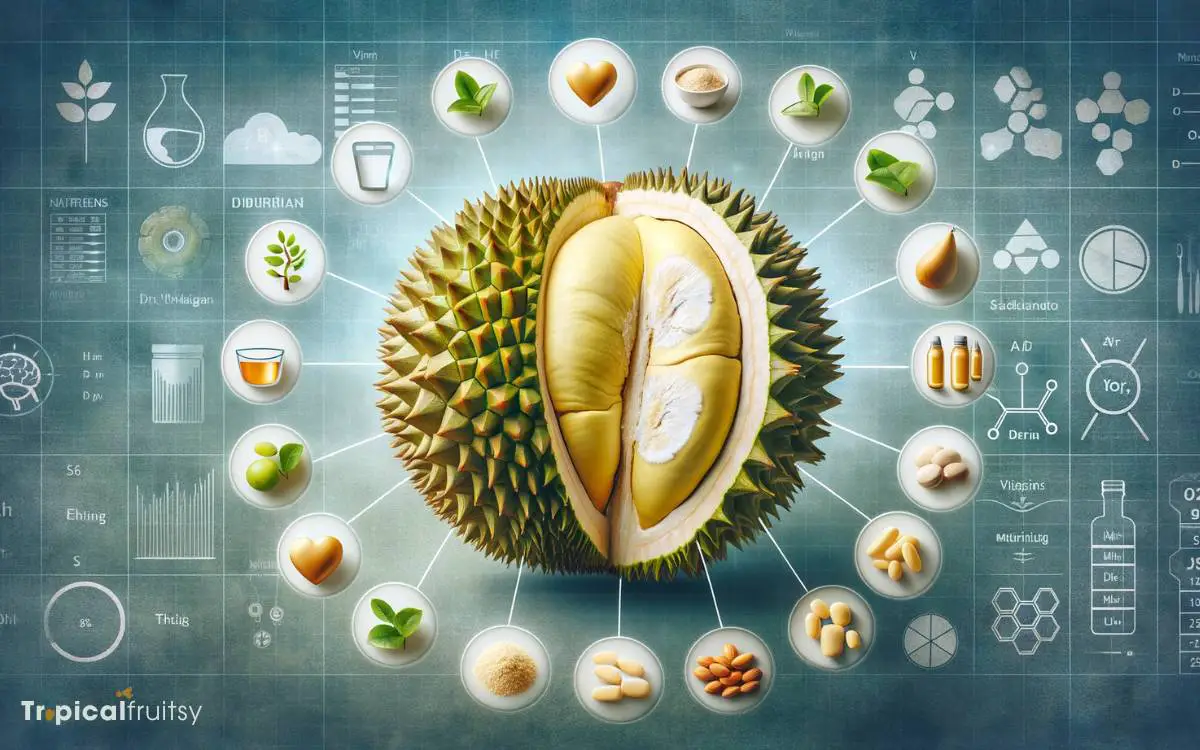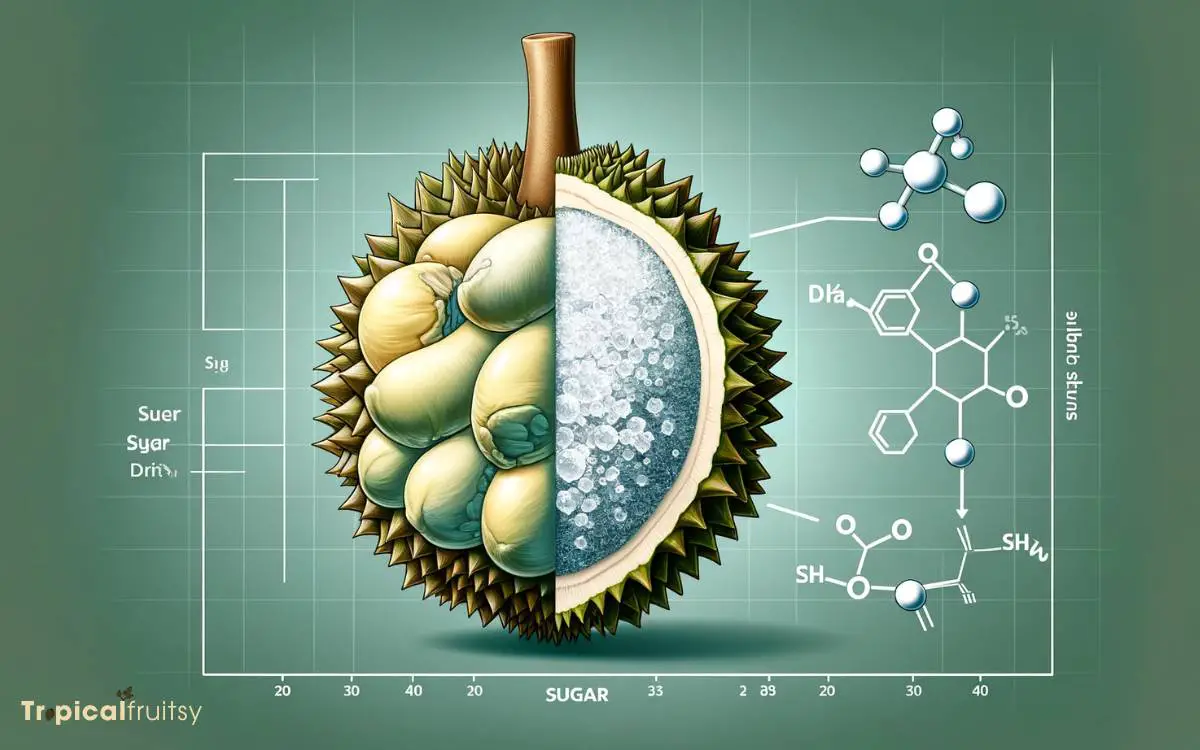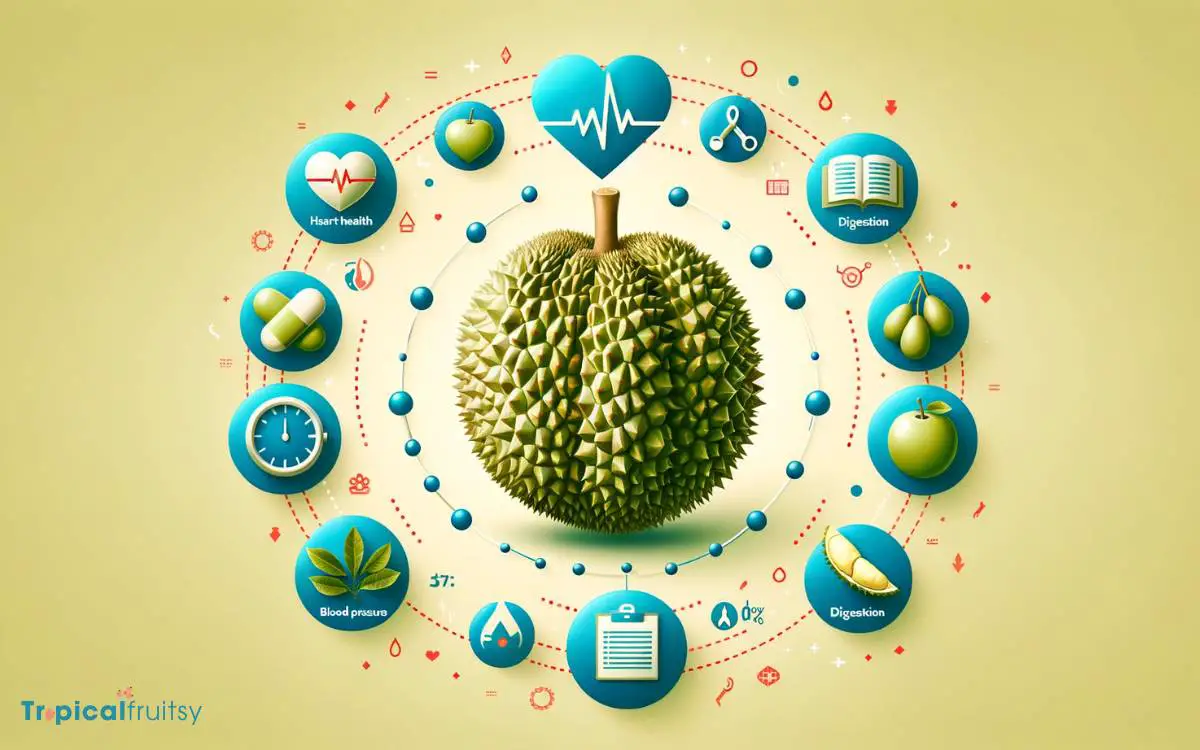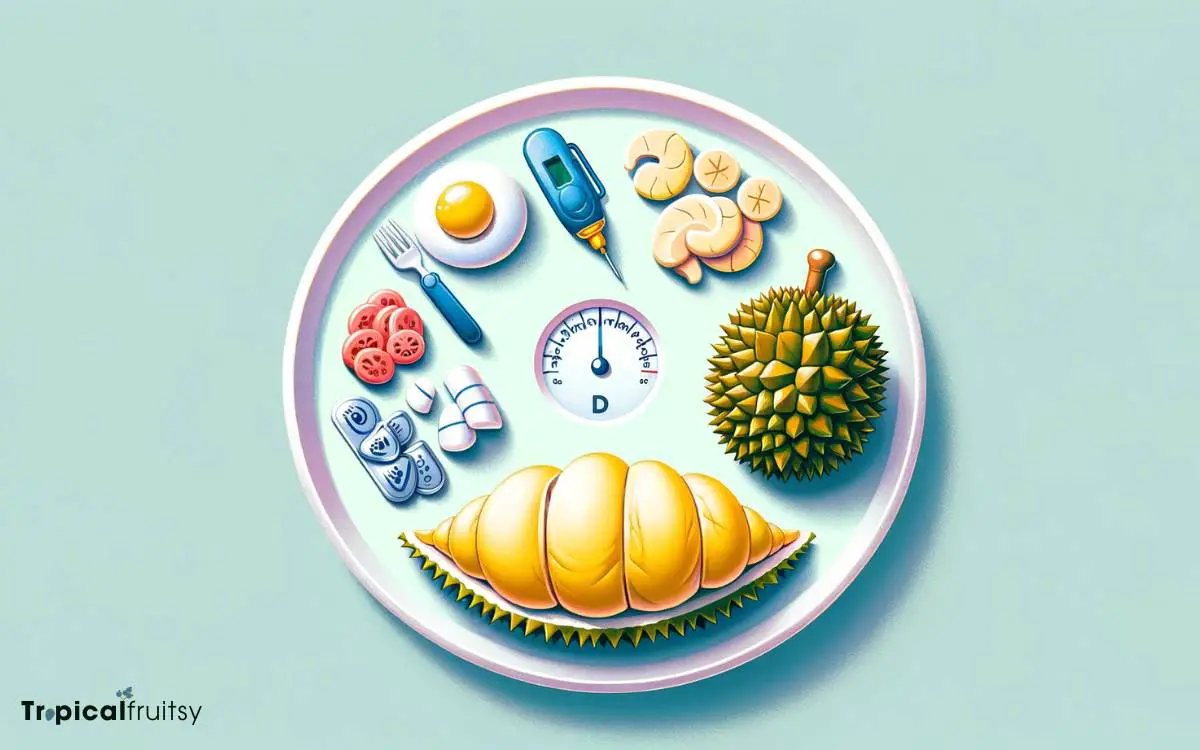Is Durian Good for Diabetes? Unveiling Durian’s Potential!
Durian, known for its pungent aroma, can be consumed by diabetics in moderation. Despite its high glycemic index of 49, which can lead to a moderate rise in blood sugar levels, portion control is key.
It is also rich in fiber, vitamins, and healthy fats which can be beneficial for overall health.
For individuals with diabetes, eating fruits like durian involves considering their impact on blood glucose levels.
The glycemic index (GI) is a ranking of how carbohydrate-containing foods affect blood sugar, with high GI foods causing rapid spikes.
Although durian has a moderate GI, its fiber content can help slow down the absorption of sugar. It’s also packed with essential nutrients:
However, due to its calorie density, it’s important for diabetics to pay attention to serving sizes when consuming durian.
For diabetics looking to enjoy durian, moderation is the watchword—small portions ensure the fruit’s health benefits without compromising blood sugar control.

Key Takeaway
Understanding Diabetes

Diabetes, commonly characterized by chronic hyperglycemia, affects individuals worldwide with increasing prevalence.
It is a metabolic disorder where either the pancreas does not produce enough insulin or the body cannot effectively use the insulin it produces.
This leads to elevated levels of glucose in the blood, which can cause a variety of health complications over time, such as cardiovascular disease, kidney failure, vision loss, and neuropathy.
Management of diabetes involves a combination of medication, lifestyle changes, and diet control to maintain blood glucose levels within a target range.
As diet plays a crucial role in diabetes management, understanding the nutritional content of foods, such as durian, is essential.
Nutritional Profile of Durian

The nutritional profile of durian is complex, with a high caloric content and significant sugar levels that warrant consideration for individuals managing diabetes.
Each serving contains a unique combination of carbohydrates, fats, and proteins, alongside a range of vitamins and minerals.
Evaluating these nutritional aspects is essential to understanding the impact of durian consumption on blood glucose control.
Caloric Content
Understanding the nutritional profile of durian is essential, as it contains a high caloric content that must be factored into the dietary management of diabetes.
Durian, known for its distinctive smell and taste, is also notable for its rich caloric density. This aspect is particularly relevant for individuals with diabetes, who need to monitor their energy intake closely.
Here are key points to consider:
- A typical serving of durian (about 100 grams) contains approximately 147 calories.
- Durian is rich in carbohydrates, with one serving providing around 27 grams, which directly influences blood sugar levels.
- It also contains dietary fiber, about 3.8 grams per serving, which can help modulate the post-meal glucose spike.
These nutritional facts underscore the importance of portion control and careful integration of durian into a diabetic diet plan.
Sugar Levels
Delving deeper into durian’s nutritional profile, one must consider its sugar content, as a single serving contains significant levels of naturally occurring sugars that can affect blood glucose regulation in individuals with diabetes.
On average, a cup of fresh durian flesh (approximately 237 milliliters) provides about 27 grams of sugars, contributing to its sweet taste. This is a considerable amount, especially for those managing their carbohydrate intake.
Despite its richness in sugars, durian also brings a substantial amount of dietary fiber, vitamins, and minerals to the table, which can influence the overall impact of the fruit on blood sugar levels.
Understanding how durian’s sugar content may influence its glycemic index is crucial for individuals with diabetes.
Durian’s Glycemic Index

The glycemic index (GI) is a ranking of how carbohydrate-containing foods affect blood glucose levels. It is a crucial consideration for individuals managing diabetes.
Durian has a GI value that may influence blood sugar differently compared to other fruits. This necessitates a closer examination for those with this condition.
Comparative assessments of fruit GI values can provide clearer dietary guidelines for individuals seeking to maintain optimal blood glucose control.
Durian GI Value
One must consider the Glycemic Index (GI) of durian, which is a measure of how quickly blood sugar levels rise after eating a particular food, to evaluate its suitability for individuals with diabetes.
The GI value can vary based on several factors, including ripeness and preparation method.
For durian, it’s important to note:
- The GI of durian typically ranges between 42-55, categorizing it as a low to moderate GI food.
- Consuming durian in moderation may prevent significant spikes in blood sugar levels.
- Pairing durian with foods high in fiber, protein, or healthy fats can lower the overall GI of a meal.
These points provide a foundation for understanding how durian might affect blood glucose management in diabetes.
Blood Sugar Impact
Durian’s glycemic response, an essential factor for diabetes management, indicates a lower risk of blood sugar spikes due to its low to moderate Glycemic Index (GI) values.
This tropical fruit, while high in carbohydrates, has a GI that ranges from 42 to 49, which is considered low to moderate compared to other fruits.
A low GI corresponds to a slower rate of glucose release into the bloodstream, which can be beneficial for individuals with diabetes, aiming to control their blood sugar levels.
However, it’s important to note that individual responses to dietary glucose can vary. Therefore, portions should be consumed judiciously, and blood sugar should be monitored to assess the personal impact.
Consulting with a healthcare provider is advised for tailored dietary advice.
Comparing Fruit Indexes
Building upon the understanding of durian’s impact on blood sugar, it is instructive to compare its Glycemic Index with those of other commonly consumed fruits to contextualize its suitability for diabetics.
The Glycemic Index (GI) is a ranking of carbohydrates on a scale from 0 to 100 based on how much they raise blood sugar levels after eating.
Here are the GI values for several fruits:
- Durian: Ranges from 42 to 49, which is considered low to moderate.
- Watermelon: Has a high GI of around 76.
- Apples: Typically have a lower GI of approximately 36.
Fruits with a low GI are generally preferred for individuals managing diabetes, as they lead to a slower and smaller rise in blood sugar levels.
Sugar Content Analysis

The sugar content of durian is a critical factor to consider when evaluating its suitability for individuals managing diabetes.
While durian is known for its rich taste and nutritional benefits, its sugar levels can be concerning.
It’s essential to understand how much sugar a serving of durian contains and how this fits into the dietary needs of someone with diabetes.
| Nutrient | Per 100g of Durian |
|---|---|
| Sugars | 27g |
| Fiber | 3.8g |
| Calories | 147 |
These figures are indicative of its high energy density and sugar content, which could lead to increased blood sugar levels if consumed in large amounts.
It is imperative for those with diabetes to monitor their carbohydrate intake and consider the portion size of durian in their diet.
Impact on Blood Sugar Levels

Understanding the impact of durian on blood sugar levels is crucial for individuals with diabetes, as its high sugar content can significantly affect glycemic control.
To assess the relationship between durian consumption and blood glucose, consider the following:
- Glycemic Index (GI): Durian has a moderate GI, which means it raises blood sugar levels at a slower rate compared to high GI foods.
- Portion Size: The amount of durian consumed at one time plays a pivotal role in determining its impact on blood sugar levels.
- Nutritional Content: Durian’s fiber, fat, and protein content can influence the absorption of sugar, potentially moderating the spike in blood glucose.
Balancing durian intake with these factors in mind can help manage blood sugar responses.
Health Benefits for Diabetics

Durian, with its unique nutritional profile, may offer several health advantages for individuals managing diabetes.
This tropical fruit is rich in dietary fiber, which can slow the absorption of sugar and improve blood sugar levels.
Moreover, durian contains various vitamins and minerals, including vitamin C, potassium, and magnesium, which are essential for overall health and can aid in the prevention of diabetes-related complications.
Its antioxidant properties may also play a role in reducing oxidative stress and inflammation, conditions often exacerbated in diabetics.
However, despite these potential benefits, durian is also high in natural sugars and calories, which necessitates moderation in consumption.
Understanding the balance between these beneficial nutrients and the fruit’s sugar content is critical, leading us into a discussion of the potential risks for diabetic individuals.
Risks for Diabetic Individuals

Glycemic control is a critical concern for diabetic patients when considering the consumption of durian, due to its high natural sugar content.
Although it contains nutrients beneficial for general health, the impact on blood sugar levels cannot be overlooked.
When eaten in excess, the following risks are associated with durian consumption for individuals managing diabetes:
- Increased Blood Sugar Levels: The fructose in durian can lead to a rapid increase in blood glucose, which is particularly problematic for glycemic management.
- Caloric Density: Durian is high in calories, which, if not accounted for within a daily dietary allowance, may contribute to weight gain—a risk factor for worsening diabetes control.
- Potential Interaction with Medication: Some compounds in durian may interact with diabetes medications, affecting their efficacy or causing adverse effects.
It is advisable for diabetic patients to consult with a healthcare provider before incorporating durian into their diet.
Portion Control and Consumption

Although durian possesses nutritional benefits, meticulous portion control is essential for diabetic individuals to prevent adverse effects on blood sugar levels.
The natural sugars and carbohydrates in durian can lead to a significant increase in blood glucose if consumed in large quantities. Therefore, understanding the appropriate serving size is crucial.
| Nutrient | Recommended Serving Size for Diabetics |
|---|---|
| Total Carbohydrates | 15 grams (approx. 1/2 cup durian flesh) |
| Sugars | Incorporated in total carbohydrates |
| Fiber | 2-3 grams (beneficial for blood sugar control) |
| Glycemic Index | 49 (moderate, portion size will impact the effect) |
Eating durian in moderation and measuring the actual intake can help manage blood sugar levels effectively. This approach aligns with the general dietary guidelines for diabetes management.
Expert Recommendations

Healthcare professionals often advise diabetic patients to include low glycemic index fruits like durian in their diets with careful attention to portion sizes. When consumed in moderation, durian can be part of a healthy diet for individuals with diabetes.
However, experts emphasize certain considerations:
- Monitor Blood Sugar Levels: Patients should check their blood glucose to understand how durian affects their individual sugar control.
- Consult a Dietitian: It’s crucial to seek personalized advice from a registered dietitian to integrate durian into a diabetes meal plan effectively.
- Balance with Other Foods: Durian should be balanced with lower carbohydrate foods to prevent blood sugar spikes.
These guidelines aim to support diabetic patients in making informed dietary choices, recognizing that individual responses to foods can vary significantly.
Conclusion
Durian, with its distinct dietary dynamics, demands diligent deliberation in diabetic diets. Although the fruit is furnished with favorable nutrients, its glycemic index and glucose generation necessitate moderated munching.
Rigorous research recommends regulated intake, recognizing the relevance of individual responses to sugar.
Diabetics should discuss durian consumption with healthcare providers, ensuring an equilibrium between enjoying exotic edibles and maintaining metabolic harmony.






